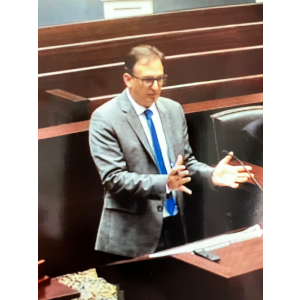Guardianship Basics
When a guardianship petition is filed by the petitioner, it is part of a two step process: the petition for guardianship, and the petition for incapacity. Once the petition for incapacity is filed, the guardianship court will appoint a three person panel to examine the proposed incapacitated person. The panel is typically made up of a medical doctor (physician), psychologist, and a lay person. These committee members will examine the proposed incapacitated person, in person, to determine whether the person is incapacitated and whether a guardian is necessary. If two or three members of the committee determine that the person is incapacitated, the proceedings continue. If two or three guardianship committee members determine that the person is not incapacitated, the guardianship proceedings are halted and the petition for incapacity (along with the petition for guardianship) is dismissed.
If at least two committee members determine incapacity, the incapacity proceedings continue. The guardianship court will appoint a guardianship attorney to represent the alleged incapacitated person. Instead of using the court appointed guardianship attorney, the alleged incapacitated person has the right to have a different attorney represent them at the trial.
The next step is the trial on incapacity. At the trial, the petitioner who filed the guardianship petition, a next of kin, or interested person may present witnesses and evidence as to whether the alleged incapacitated person is in fact incapacitated. An expert witness on the alleged incapacitated person’s mental state is permissible.
If the guardianship court makes an evidentiary finding of incapacity, the next step in the proceedings is a hearing on whether a guardianship is necessary. The hearing on whether a guardian will be appointed, and if so who, may take place at the incapacity hearing, or it may take place at a subsequent hearing.
If the incapacitated person has put in place documents in advance, it might be possible to avoid the appointment of a guardian, even if incapacity has been found. These documents include the creation and funding of a revocable living trust, the creation of a durable power of attorney, and the creation of a health care proxy. If there are such less restrictive means to having a guardian appointed, the guardianship court is required to implement these less restrictive means instead of the guardianship.
If the guardianship court decides that the appointment of a guardian is necessary (i.e., incapacity and no less restrictive alternative to a guardianship), the court is next required to determine whether a preneed guardianship designation is in place. The preneed guardianship designation is a document that names a person to serve as guardian in the event one is needed.
The guardianship court will then, at this point, appoint the person designated or appoint another person to serve as guardian, which can be a family member of professional guardian.
The guardian is required to retain the service of a guardianship lawyer at all stages of the proceedings, so that the requirements of a guardian can be met.
Once the initial proceedings are concluded, the lawyers involved in the case will typically seek attorneys fees from the guardianship. Please see the Complete Guide to Attorney Fees in Florida Guardianship for more information.
In all guardianship proceedings, every person who wishes to participate must have standing to do so. Please review the Complete Guide to Standing in Guardianship Proceedings to learn more.
Types of Guardianships
Guardianship for Elderly
A typical guardianship is for an elderly person suffering from the effects of degenerative brain disease, such as Alzheimer’s. The detailed procedures for obtaining guardianship are here.
Guardianship for Minors
A guardianship for a minor is typically accompanied by a family tragedy, such as the loss of both parents. In some situations, a guardianship is necessary to hold an inheritance.
If a minor is going to receive compensation because of a personal injury, there are procedures in place to ensure fair treatment of the minor. These rules must be precisely followed.
There are alternatives to a guardianship for a minor that should always be explored.
Guardianship Litigation
Incapacity Proceedings. Under Florida law, when a petition for incapacity is filed, the guardianship court will appoint a three member panel to examine the alleged incapacitated person. Typically the persons appointed include a medical doctor in the area of psychiatry, a psychologist, and a lay person. If two of the three persons find the alleged incapacitated person to be incapacitated, the guardianship court will have a hearing on incapacity. The guardianship court will appoint an attorney to represent the alleged incapacitated person. The alleged incapacitated person has the right to hire their own attorney to defend against the incapacity proceeding.
Steps can be taken to avoid or minimize the chances of a guardianship being imposed.
Appointment of Guardian. If the guardianship court finds the person to be incapacitated, the court will determine whether a guardianship is needed. The court is required to determine whether there is a “less restrictive alternative” to a guardianship. For example, if the incapacitated person already has their assets in a trust, and also has a health care directive in place along with a durable power of attorney, the court might not appoint a guardian.
Choice of Guardian. If the court finds that the appointment of a guardian is necessary, the guardianship court will appoint a guardian. If one able family member applies for the position, that person is likely appointed. If more than one person applies, the guardianship court will hold an evidentiary hearing to determine the most appropriate person to appoint. In such disputes, there are often allegations of financial abuse and self dealing directed towards each of the family members. In extreme cases of family disfunction, the guardianship judge may appoint a professional guardian.
Guardianship Accounting. A Florida guardian is required to file an annual accounting of the guardianship finances. Many guardians struggle to properly and accurately report their activities, and some engage in acts of self dealing and theft from guardianship accounts. A family member or the court can pursue the improper acts of a guardian. The guardianship court can also appoint a court monitor to determine whether the guardian is properly carrying out the duties required of the guardian.
Removal of Florida Guardian. If a Florida guardian has performed poorly, the court on its own ar at the request of a family member can hold a hearing to determine whether the guardian should be removed. Grounds for removal include lack of proper care of the ward, financial self dealing, theft, lack of proper accountings, and lack of compliance with court orders.
Request for Authority to Act. Guardians are empowered, on their own, to engage in the day to day care and maintenance of the ward. If the guardian wants or needs to do something else, permission from the guardianship court is often required. For example, the guardian will need permission to sell the real estate of the ward and to enter into contracts. These actions can be challenged if appropriate.
Taking Control of a Trust. Guardianship can allow the guardian to take control of the ward’s revocable trust if necessary, by replacing the trustee.
FAQ
How is Incapacity Determined?
An evidentiary hearing is held where a trial court judge will determine incapacity.
Any adult may file with the court a petition to determine another person’s incapacity setting forth the factual information upon which they base their belief that the person is incapacitated. The court then appoints a committee of two professionals, usually a physician and a psychologist, and a lay person to examine the person and report its findings to the court. The court also appoints an attorney to represent the person alleged to be incapacitated.
If a majority of the examining committee (at least 2 of the 3) concludes that the alleged incapacitated person is not incapacitated in any way, the court will dismiss the petition. If the examining committee finds (at least 2 of the 3) the person to be incapable of exercising certain rights, however, the court schedules a hearing to determine whether the person is totally or partially incapacitated. A guardian is usually appointed at the end of the incapacity hearing.
Who Can be a Guardian?
Any adult resident of Florida can serve as a guardian. A close relative of the ward who does not live in Florida may also serve as a guardian. Persons who have been convicted of a felony or who are incapable of carrying out the duties of a guardian cannot be appointed. Institutions such as a bank trust department, a nonprofit religious or charitable corporation, or a public guardian, can be appointed guardian, but a bank trust department may only act as guardian of the property.
The court gives consideration to the wishes expressed by the incapacitated person in a written declaration of preneed guardian or at the hearing.
Of course, a guardian should not have a conflict of interest with the ward.
What are the Duties of a Guardian?
A guardian who is given authority over any property of the ward shall inventory the property, invest it prudently, use it for the ward’s support, and account for it by filing detailed annual reports with the court. In addition, the guardian must obtain court approval for certain financial transactions. The guardian of the ward’s person may exercise those rights that have been removed from the ward and delegated to the guardian, such as providing medical, mental and personal care services and determining the place and kind of residential setting best suited for the ward. The guardian of the person must also present to the court every year a detailed plan for the ward’s care.
Is a Guardian Accountable?
Yes. Guardians must be represented by an attorney who will serve as “attorney of record.” Guardians are usually required to furnish a bond and may be required to complete a court-approved training program.
The Clerk of the Court reviews all annual reports of guardians of the person and property and presents them to the court for approval. A guardian who does not properly carry out his or her responsibilities may be removed.
Is a Guardianship Permanent?
Not necessarily. If a person recovers in whole or part from the condition that caused him or her to be incapacitated, the Florida guardianship court will have the ward reexamined and can restore some or all of the person’s rights.
Are There Alternatives to a Guardianship?
Yes. Florida guardianship law requires the use of less restrictive alternatives to protect persons incapable of caring for themselves and managing their financial affairs whenever possible. If a person creates an advance health care directive and a durable power of attorney or revocable living trust while competent, he or she may not require a guardian in the event of incapacity.
Can a Minor Be In a Guardianship?
Yes. A child’s parents are the child’s natural guardians and in general may act for the child. In circumstances where the parents die or become incapacitated or if a child receives an inheritance or proceeds of a lawsuit or insurance policy exceeding $15,000, the court must appoint a guardian. Both parents or a surviving parent may make and file with the Clerk of the Court a written declaration naming a guardian of the child’s person or property to serve if both parents die or become incapacitated. A guardian may also be designated in a will in which the child is a beneficiary.
Is Due Process Required?
Yes, all interested persons in a guardianship are entitled to due process.









